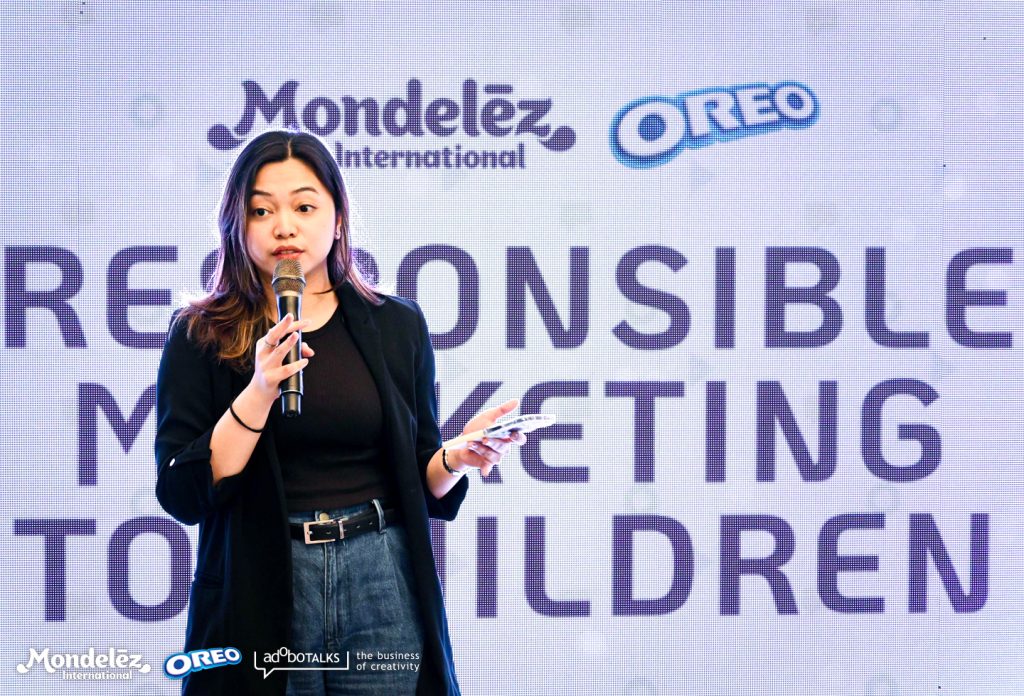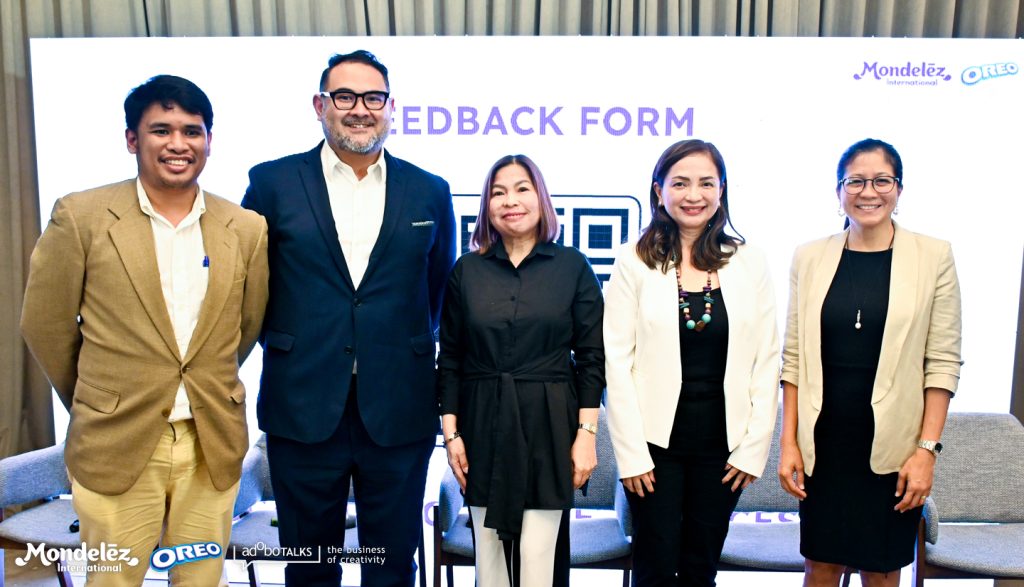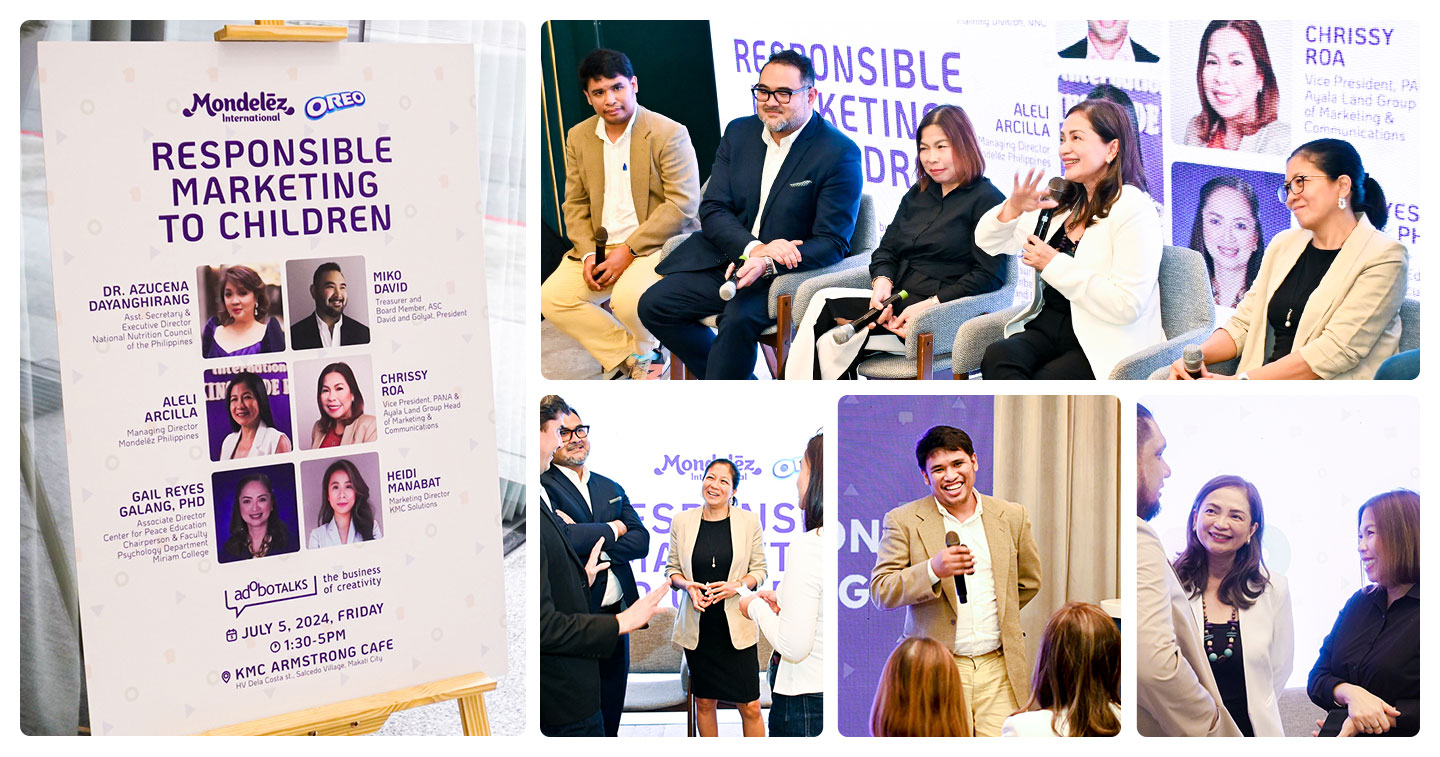MANILA, PHILIPPINES — “It takes a village to raise a child.” Derived from an African proverb, the quote’s essence is to set up children, specifically in marginalized communities, for success by providing a safe and healthy environment. But, in this day and age, a village goes beyond extended family and friends; corporations now play a crucial role in a child’s development with the prominence of the internet. This raises the question: how should companies bear the responsibility of ethical marketing towards minors?
This month’s adoboTalks discussion, produced in partnership with Mondelēz International, was an overflow of people, snacks, and insight on the topic. The session, which took place on July 05, 2024, at KMC Armstrong Cafe, was packed with attendees eager to listen to what the speakers and panelists had to say about “Responsible Marketing to Children.”
Adobo Magazine Associate Editor Pauline Nacar emphasized the talk’s significance in her opening remarks. “The welfare of our country’s future generations takes the spotlight. Young as they may be, children are already exposed to marketing campaigns and advertising that are tailored to their wants, and it’s up to the brands to adhere to ethical standards and responsible approaches with their materials.”

The first guest, Kristian Jebsen Bandong, Nutrition Officer for the Nutrition Policy and Planning Division at the National Nutrition Council, elaborated on the Philippine government’s current efforts to regulate advertising and marketing towards children, particularly when it comes to food products. He explained that several factors contribute to malnutrition, and food that may feel satiating in the moment does not necessarily meet the nutritional value needed. “A third (33%) of Filipino households can’t afford [a] nutritious diet; that’s a fact,” Jebsten stated, saying social media, particularly in the Philippines, is an alleged key factor in the unhealthy dietary landscape among children today.


To combat the crisis, Jebsen mentioned various interventions that are managing obesity and malnutrition, such as the Philippine Plan of Action for Nutrition 2023-2028 which addresses malnutrition across all life stages and plans with the Department of Education (DepEd) to make healthy living more appealing to children. The goal, according to Jebsen, is to focus on better diets and practices while including a more multi-sectoral, holistic approach. That means making healthier food options more accessible to the public and for the government and industries to support these important advocacies.
Aleli Arcilla, Managing Director of Mondelēz International in the Philippines, graced the stage next to impart the steps the company has been taking to ensure an ethical approach when marketing their products. “As a global leader in snacks, every year, we make it a responsibility to know about snacking: why consumers all over the world snack and why they do it.” She brought up their “State of Snacking Report,” which has been released annually for the past five years, and listed the four pillars of this year’s report:
- An evolving consumer mindset: Six in ten global consumers prefer to eat many small meals throughout the day as opposed to three larger ones.
- Mindful snacking: 67% look for snacks that are portion-controlled. The number one snacking advice from global consumers is, “Everything is fine in moderation.”
- Snack curation: 76% are loyal to certain snacks or brands for a long time, and 59% consider themselves “snack adventurers” — people who enjoy trying new snacks.
- Snacking with purpose: 67% prioritize snacks with less plastic packaging while 74% typically recycle their snack packaging.



Aleli underscored the importance of marketing responsibly for the majority of her presentation. “[Marketing responsibility] is important because it is the heart of our policy. We believe it is the gatekeepers — the parents and guardians — who should ultimately make the decision on what food their children should consume.” Active measures are being taken on Mondelēz International’s end to implement this: no advertising directed to children under age 13, no in-school marketing below the university level, and no showcasing overindulgence to encourage unhealthy behavior, among others.
All these efforts are to drive the main point home. “We understand that we have a very significant role to play in ensuring that our consumers snack mindfully, and they choose well,” Aleli said as she drew to a close.
As the last speaker, Miko David, President of David & Golyat; and Treasurer and Board Member of ASC talked about data dynamics, regulation in the marketing industry as well as ASC’s procedures when catering to young audiences. “When we advertise for children, the avenue will be specific in certain touchpoints.”


To make sure that customers, especially children, are not misled, harmed, or offended by ads and that fair competition is encouraged, self-regulation — from ASC’s standpoint — is a must. “Hey, is it truthful what we’re advertising?” is the question that serves as Miko and the organization’s guiding light, and ASC’s goal to preserve the truth through accountability is seen in their ASC Code of Ethics & Standard Manual of Procedures. “To have a framework, you have to have a code of ethics [which] is our basis that should be applied to all [sectors].”
Before the event concluded, Chrissy Roa, Vice President of PANA and Ayala Land Group Head of Marketing and Communications, and Dr. Gail Reyes, Galang, PHD, Associate Director Center for Peace Education Chairperson and Faculty Psychology Department at Miriam College, joined the speakers and Marco Sumayao, adobo Magazine’s Editorial Director and the event’s host and moderator, for a fruitful, hour-long panel discussion about the psychological impact of marketing on children, strategies for developing age-appropriate advertisements and balancing commercial interests with child well-being.





When asked how to form a coalition of action to ensure responsible marketing to children, both Chrissy and Dr. Gail offered compelling answers. “We all should be advocates for children [first]. Then, we can be advocates [for] the products we try to sell,” Dr. Gail said.
The problems regarding children, food insecurity, and advocating for healthier lifestyles may be complex, but to Dr. Gail, knowledge is power, and that knowledge should be integrated into the structures of society. “For association[s], education is key, and I think it’s also important to get NGOs involved.” She then touched on how parents, psychologists, and professionals should verify the ethicality of commercials and campaigns that market to children.
Meanwhile, Chrissy thinks parents should be included in the conversation, especially as their first guardians and primary caregivers. “I, myself, am a mother, and I always [used to] ask myself back in the day, ‘Is this going to be something that is beneficial to my children?’ It always has to answer those questions positively because at the end of the day, what we are protecting are the rights of our children.”

Adobo Magazine believes that to build a better tomorrow, one must guide the children of today. Children are a product of their environment and the adoboTalks was a call for companies, along with parents and guardians, to work together in creating a world where the next generation can flourish.










